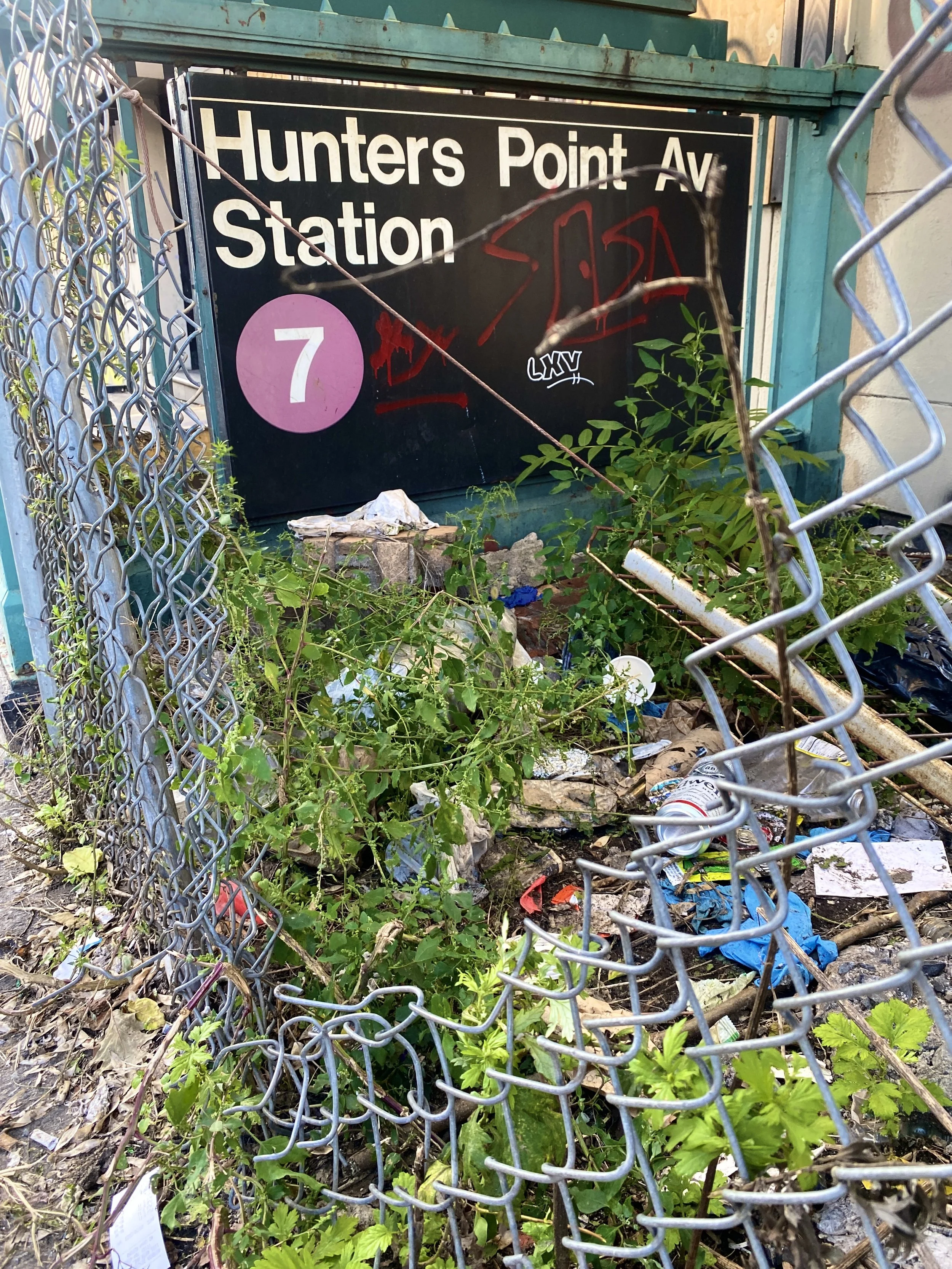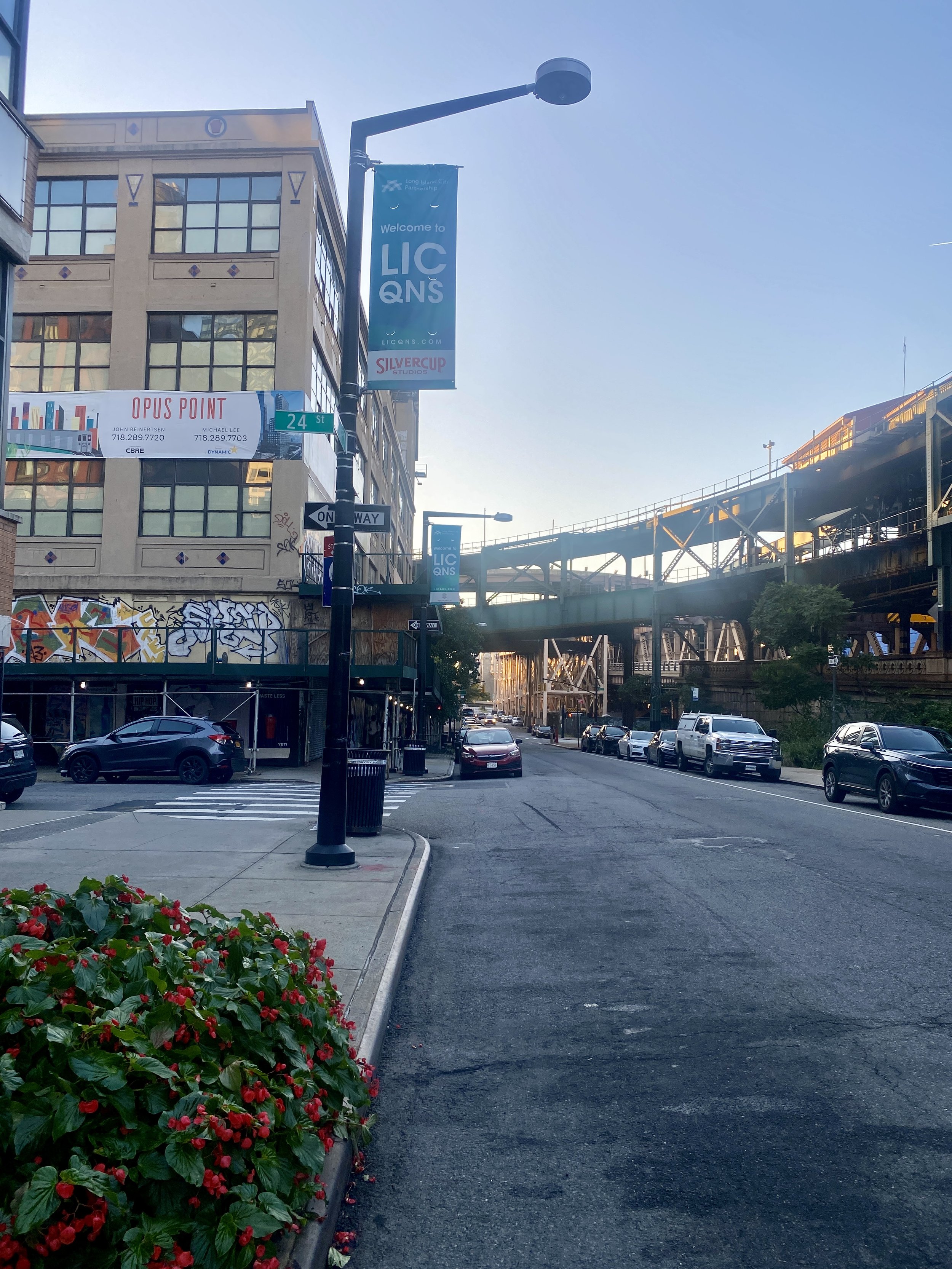In LIC, a BID expansion raises questions about role of local government
/The Long Island City Partnership is attempting to expand further into LIC. Its expansion has raised questions about the role a public-private partnership should have in providing services typically provided by local government, including sanitation. Eagle photo by Elisa Muyl
By Elisa Muyl
In Long Island City, where gleaming towers sprout above warehouses, a line of uniform blue banners march along Jackson Avenue greeting visitors. “Welcome to LIC QNS,” they read.
The banners have been placed throughout the neighborhood by the Long Island City Business Improvement District, or BID, which is vying to expand further beyond the neighborhood’s commercial core and into areas surrounding Sunnyside Yards. It got a step closer to that goal last week, when the Department of Small Business Services, which oversees New York City’s BIDs, said it could enter the final, legislative phase of the city’s BID expansion process. If successful, the BID, which is run by the Long Island City Partnership, aims to launch the expansion in July 2024.
The BID, founded in 2005, provides supplemental sanitation, beautification and business marketing services funded by a tax on commercial and mixed-use properties within its boundaries. It hires contractors to sweep and collect trash from Long Island City sidewalks, and hangs festive holiday lighting to keep the district well-lit during the winter.
Laura Rothrock, the executive director of the BID, says the neighborhood’s rapid growth has driven the need for the Long Island City Partnership’s expansion.
“With all of the new development in Long Island City – and there's a lot of construction still going on – it does bring a lot of foot traffic, which is great, but it also… brings the need for more services, like sanitation,” she said.
While New York’s 76 BIDs are a familiar part of the city’s landscape, they have also been controversial, particularly in Western Queens, where some residents see them as harbingers of development and gentrification. Though by law, city services may not be reduced because of the presence of a BID, some also worry that BIDs allow local government to delegate public services to the public-private partnerships, which aren’t held to account in the same way elected officials are.
With the Long Island City Partnership’s expansion now under review, questions about the division of responsibilities between the BID and the city have begun to arise.
But while some see the BID as unnecessary, others say it provides a speedy alternative to an otherwise sluggish and bureaucratic process.
The Long Island City Partnership, a BID, is seeking to expand further into LIC. Eagle photo by Elisa Muyl
During a Land Use and Housing Committee meeting on Sept. 27, members of Community Board 2 were swayed by testimony from small business owners in the proposed expansion area who said that the BID would provide essential services to support their businesses – services that are not regularly provided by the city.
Andrew Yuan, who co-owns Knock Knock, a restaurant on Crescent Street, spoke at the meeting in favor of the BID. His restaurant is located inside the BID’s proposed expansion area.
However, he’s already been told to reach out to the BID for services.
Yuan told the committee that when he recently contacted City Councilmember Julie Won’s office about insufficient sanitation services near his restaurant, he was directed to the BID.
A spokesperson for Won’s office said that the councilmember and her staff sometimes direct business owners to the Long Island City Partnership because the BID may be able to remedy an issue quicker than government can.
“Our office shares constituent requests with LICP when they fall within the BID lines for immediate needs including litter, graffiti, and street clean-ups, and neighborhood beautification efforts,” the spokesperson said. “Many of the issues we bring to the LICP can be addressed immediately.”
John Ritter, from Sholom & Zuckerbrot Realty, also testified on behalf of the BID because he believed it would help resolve issues plaguing his tenants, Beacon Building Products. During the meeting, he said letters and calls to the city about a sinking section of 10th Street, in front of their property, went unanswered. Ritter, who is on the steering committee for the expansion, said early conversations with members of the BID have convinced him they’ll be more responsive than the city. He also said that he believed the BID could connect him with local officials who could address his sidewalk issue.
In response, members of the community board told Ritter that they could do the same for him, and encouraged him to reach out to them in the future.
“The community board is your community board – your taxes fund us, and that's how we get stuff done for you,” committee member Morry Galonoy said during the meeting. “You shouldn’t get double taxed.”
Nonetheless, Ritter said he believes he’ll have an easier time resolving quality-of-life issues, including getting litter outside of his building removed, by working through the BID.
“The sanitation department says, ‘It's your problem…and you clean it up, and if you don’t clean it up, you get a ticket,’” he said at the meeting.
Lisa Deller, the chair of Community Board 2’s Land Use and Housing Committee voted in favor of the BID’s expansion, primarily to address businesses’ frustration over the alleged lack of services.
“We need people to clean the street, we need graffiti removal and we’re not getting that,” Deller said.
A map showing the area the LIC Partnership is proposing its expansion. Map via LIC Partnership
But while some see the ease in which services are received from the BID as a positive, others see it as a potential problem, even if just in principle.
“In my view, what the BID is doing, the government should be doing,” Danielle Brecker, the chair of Community Board 2, said.
Brecker voted against the expansion. In addition to concerns about delegating public services to a public-private partnership, she said that many of the issues raised at the September committee meeting were infrastructure issues the BID wouldn’t be able to address. As the co-lead organizer of Empire State Indivisible, a chapter of the progressive activist network Indivisible, she said accountability for resolving those neighborhood issues lies with elected officials.
“What we should be doing is applying pressure and holding our elected leaders to account,” she said.
Susanna Schaller, a City College professor whose research area includes BIDs, said that “if the city isn't responding and isn't actually addressing what should be public service provision and sanitation, then local stakeholders may come to believe that the only option becomes perhaps a privatized option.”
“The real question is: What is the public responsibility here versus a private responsibility?” Schaller added.
During the Sept. 27 meeting, the committee voted in favor of the BID’s expansion, a decision that was approved the following week by the full board. The board vote served as a recommendation to Won. She later wrote a letter of support for the BID, as required by the Department of Small Business Services in an expansion.
In the coming months, the BID’s expansion will be put through the city’s full review, which will include a public comment period and another appearance before the community board.
Despite the support expressed for the BID’s expansion at the community board meeting and the support the BID has received from Won, several BIDs have had difficulties seeking approval in Western Queens in the past.
In 2017, a proposal to expand the Jackson Heights-Corona BID was quietly abandoned after years of sustained opposition by locals; in neighboring Woodside, a proposed BID died on the vine in 2012.
There have been eight successful expansion proposals since 2018, according to the SBS’s annual reports.






